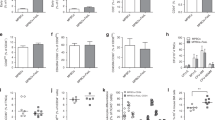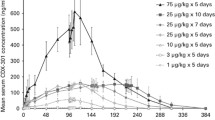Abstract
Humanized mice have become useful animal models for HIV/AIDS. Since NOD.Cg-Prkdc scid Il2rgtm1Wjl/SzJ (NSG) mice allow the engraftment of primary human immune cells, we aim to determine the role of human Fms-related tyrosine kinase 3 ligand (hFlt3L), a major growth factor for dendritic cells (DCs), in regulating the differentiation of cord blood-derived CD34+ progenitor cells in this murine species. Soluble recombinant hFlt3L protein and AAV-vectored hFlt3L were administrated before or after human CD34+ progenitor cell transplantation, respectively. We then measured the peripheral levels of hFlt3L by ELISA. Meantime, reconstituted human immune cells were analyzed by flow cytometry over time. We found that without hFlt3L there were significantly increased types of human immune cells in NSG-huCD34 compared with NSG-huPBL mice but the frequency of human DCs remains low. Transient treatment with recombinant hFlt3L expanded human conventional CD1c+ and CD141+ DCs as well as plasmacytoid DCs in humanized NSG-huCD34 mice. Surprisingly, however, the prolonged in vivo expression of AAV-vectored hFlt3L resulted in significant suppression of total human CD34+ cell engraftment and differentiation. The suppression occurred within 2 weeks when AAV-vectored hFlt3L was administered either before or after the transplantation of CD34+ progenitor cells, which was likely associated with the induction of murine myeloid-derived immune suppressive cells and reactive oxygen species in NSG-huCD34 mice. Since chronic HIV-1 patients displayed significantly high levels of hFlt3L expression, our findings may have implication to explore the role of prolonged hFlt3L in regulating the differentiation of human CD34+ progenitor cells in both NSG-huCD34 mice and infected people.

ᅟ





Similar content being viewed by others

References
Anandasabapathy N, Feder R, Mollah S, Tse SW, Longhi MP, Mehandru S, Matos I, Cheong C, Ruane D, Brane L, Teixeira A, Dobrin J, Mizenina O, Park CG, Meredith M, Clausen BE, Nussenzweig MC, Steinman RM (2014) Classical Flt3L-dependent dendritic cells control immunity to protein vaccine. J Exp Med 211:1875–1891
Baerenwaldt A, von Burg N, Kreuzaler M, Sitte S, Horvath E, Peter A, Voehringer D, Rolink AG, Finke D (2016) Flt3 ligand regulates the development of innate lymphoid cells in fetal and adult mice. J Immunol 196:2561–2571
Brasel K, McKenna HJ, Morrissey PJ, Charrier K, Morris AE, Lee CC, Williams DE, Lyman SD (1996) Hematologic effects of flt3 ligand in vivo in mice. Blood 88:2004–2012
Breton G, Lee J, Zhou YJ, Schreiber JJ, Keler T, Puhr S, Anandasabapathy N, Schlesinger S, Caskey M, Liu K, Nussenzweig MC (2015) Circulating precursors of human CD1c+ and CD141+ dendritic cells. J Exp Med 212:401–413
Breton G, Zheng S, Valieris R, Tojal da Silva I, Satija R, Nussenzweig MC (2016) Human dendritic cells (DCs) are derived from distinct circulating precursors that are precommitted to become CD1c+ or CD141+ DCs. J Exp Med 213:2861–2870
Chen Q, Khoury M, Chen J (2009) Expression of human cytokines dramatically improves reconstitution of specific human-blood lineage cells in humanized mice. Proc Natl Acad Sci U S A 106:21783–21788
Cheung AKL, Kwok HY, Huang Y, Chen M, Mo Y, Wu X, Lam KS, Kong HK, Lau TCK, Zhou J, Li J, Cheng L, Kiat Lee B, Peng Q, Lu X, An M, Wang H, Shang H, Zhou B, Wu H, Xu A, Yuen KY, Chen Z (2017) Gut-homing Delta42PD1(+)Vdelta2 T cells promote innate mucosal damage via TLR4 during acute HIV type 1 infection. Nat Microbiol 2:1389–1402
Choi BK, Joo SY, Moon C, Park KS, Kim SH, Park JB, Jung GO, Choi GS, Kwon CH, Chun JM, Joh JW, Lee SK, Kim SJ (2008) Reconstitution of human lymphocytes following ex vivo expansion of human umbilical cord blood CD34+ cells and transplantation in Rag2−/− gamma c−/− mice model. Transplant Proc 40:2655–2660
Ding Y, Wilkinson A, Idris A, Fancke B, O'Keeffe M, Khalil D, Ju X, Lahoud MH, Caminschi I, Shortman K, Rodwell R, Vuckovic S, Radford KJ (2014) FLT3-ligand treatment of humanized mice results in the generation of large numbers of CD141+ and CD1c+ dendritic cells in vivo. J Immunol 192:1982–1989
Durai V, Bagadia P, Briseno CG, Theisen DJ, Iwata A, JTt D, Gargaro M, Fremont DH, Murphy TL, Murphy KM (2018) Altered compensatory cytokine signaling underlies the discrepancy between Flt3(−/−) and Flt3l(−/−) mice. J Exp Med 215:1417–1435
Eidenschenk C, Crozat K, Krebs P, Arens R, Popkin D, Arnold CN, Blasius AL, Benedict CA, Moresco EM, Xia Y, Beutler B (2010) Flt3 permits survival during infection by rendering dendritic cells competent to activate NK cells. Proc Natl Acad Sci U S A 107:9759–9764
Essbach C, Andrae N, Pachow D, Warnke JP, Wilisch-Neumann A, Kirches E, Mawrin C (2013) Abundance of Flt3 and its ligand in astrocytic tumors. Onco Targets Ther 6:555–561
Honeycutt JB, Wahl A, Baker C, Spagnuolo RA, Foster J, Zakharova O, Wietgrefe S, Caro-Vegas C, Madden V, Sharpe G, Haase AT, Eron JJ, Garcia JV (2016) Macrophages sustain HIV replication in vivo independently of T cells. J Clin Invest 126:1353–1366
Huang J, Li X, Coelho-dos-Reis JG, Wilson JM, Tsuji M (2014) An AAV vector-mediated gene delivery approach facilitates reconstitution of functional human CD8+ T cells in mice. PLoS One 9:e88205
Kamran N, Kadiyala P, Saxena M, Candolfi M, Li Y, Moreno-Ayala MA, Raja N, Shah D, Lowenstein PR, Castro MG (2017) Immunosuppressive myeloid Cells' blockade in the glioma microenvironment enhances the efficacy of immune-stimulatory gene therapy. Mol Ther 25:232–248
Lee J, Zhou YJ, Ma W, Zhang W, Aljoufi A, Luh T, Lucero K, Liang D, Thomsen M, Bhagat G, Shen Y, Liu K (2017) Lineage specification of human dendritic cells is marked by IRF8 expression in hematopoietic stem cells and multipotent progenitors. Nat Immunol 18:877–888
Li HS, Yang CY, Nallaparaju KC, Zhang H, Liu YJ, Goldrath AW, Watowich SS (2012) The signal transducers STAT5 and STAT3 control expression of Id2 and E2-2 during dendritic cell development. Blood 120:4363–4373
Li B, Wang Z, Zhong Y, Lan J, Li X, Lin H (2015) CCR9-CCL25 interaction suppresses apoptosis of lung cancer cells by activating the PI3K/Akt pathway. Med Oncol 32:66
Li Y, Mention JJ, Court N, Masse-Ranson G, Toubert A, Spits H, Legrand N, Corcuff E, Strick-Marchand H, Di Santo JP (2016) A novel Flt3-deficient HIS mouse model with selective enhancement of human DC development. Eur J Immunol 46:1291–1299
Lissina A, Briceno O, Afonso G, Larsen M, Gostick E, Price DA, Mallone R, Appay V (2016) Priming of qualitatively superior human effector CD8+ T cells using TLR8 ligand combined with FLT3 ligand. J Immunol 196:256–263
Liu K, Nussenzweig MC (2010) Origin and development of dendritic cells. Immunol Rev 234:45–54
Marvel D, Gabrilovich DI (2015) Myeloid-derived suppressor cells in the tumor microenvironment: expect the unexpected. J Clin Invest 125:3356–3364
Mochizuki K, Meng L, Mochizuki I, Tong Q, He S, Liu Y, Purushe J, Fung H, Zaidi MR, Zhang Y, Reshef R, Blazar BR, Yagita H, Mineishi S, Zhang Y (2016) Programming of donor T cells using allogeneic delta-like ligand 4-positive dendritic cells to reduce GVHD in mice. Blood 127:3270–3280
Onai N, Obata-Onai A, Tussiwand R, Lanzavecchia A, Manz MG (2006) Activation of the Flt3 signal transduction cascade rescues and enhances type I interferon-producing and dendritic cell development. J Exp Med 203:227–238
Patil NK, Bohannon JK, Luan L, Guo Y, Fensterheim B, Hernandez A, Wang J, Sherwood ER (2017) Flt3 ligand treatment attenuates T cell dysfunction and improves survival in a murine model of burn wound sepsis. Shock 47:40–51
Rosborough BR, Mathews LR, Matta BM, Liu Q, Raich-Regue D, Thomson AW, Turnquist HR (2014) Cutting edge: Flt3 ligand mediates STAT3-independent expansion but STAT3-dependent activation of myeloid-derived suppressor cells. J Immunol 192:3470–3473
Shultz LD, Brehm MA, Garcia-Martinez JV, Greiner DL (2012) Humanized mice for immune system investigation: progress, promise and challenges. Nat Rev Immunol 12:786–798
Tan Z, Zhou J, Cheung AK, Yu Z, Cheung KW, Liang J, Wang H, Lee BK, Man K, Liu L, Yuen KY, Chen Z (2014) Vaccine-elicited CD8+ T cells cure mesothelioma by overcoming tumor-induced immunosuppressive environment. Cancer Res 74:6010–6021
Toliver-Kinsky TE, Cui W, Murphey ED, Lin C, Sherwood ER (2005) Enhancement of dendritic cell production by fms-like tyrosine kinase-3 ligand increases the resistance of mice to a burn wound infection. J Immunol 174:404–410
Tsapogas P, Swee LK, Nusser A, Nuber N, Kreuzaler M, Capoferri G, Rolink H, Ceredig R, Rolink A (2014) In vivo evidence for an instructive role of fms-like tyrosine kinase-3 (FLT3) ligand in hematopoietic development. Haematologica 99:638–646
Uchida N, Hsieh MM, Hayakawa J, Madison C, Washington KN, Tisdale JF (2011) Optimal conditions for lentiviral transduction of engrafting human CD34+ cells. Gene Ther 18:1078–1086
Watowich SS, Liu YJ (2010) Mechanisms regulating dendritic cell specification and development. Immunol Rev 238:76–92
Wu X, Liu L, Cheung KW, Wang H, Lu X, Cheung AK, Liu W, Huang X, Li Y, Chen ZW, Chen SM, Zhang T, Wu H, Chen Z (2016) Brain invasion by CD4(+) T cells infected with a transmitted/founder HIV-1BJZS7 during acute stage in humanized mice. J NeuroImmune Pharmacol 11:572–583
Wu X, Guo J, Niu M, An M, Liu L, Wang H, Jin X, Zhang Q, Lam KS, Wu T, Wang H, Wang Q, Du Y, Li J, Cheng L, Tang HY, Shang H, Zhang L, Zhou P, Chen Z (2018) Tandem bispecific neutralizing antibody eliminates HIV-1 infection in humanized mice. J Clin Invest 128:2239–2251
Zeng R, Bscheider M, Lahl K, Lee M, Butcher EC (2016) Generation and transcriptional programming of intestinal dendritic cells: essential role of retinoic acid. Mucosal Immunol 9:183–193
Zhou D, Shao L, Spitz DR (2014) Reactive oxygen species in normal and tumor stem cells. Adv Cancer Res 122:1–67
Zhou J, Liu M, Sun H, Feng Y, Xu L, Chan AWH, Tong JH, Wong J, Chong CCN, Lai PBS, Wang HK, Tsang SW, Goodwin T, Liu R, Huang L, Chen Z, Sung JJ, Chow KL, KF T, Cheng AS (2018) Hepatoma-intrinsic CCRK inhibition diminishes myeloid-derived suppressor cell immunosuppression and enhances immune-checkpoint blockade efficacy. Gut 67:931–944
Acknowledgments
ZC and LL designed the study, analyzed data and wrote the manuscript. LL, XT, XH, JL did the experiments. HW provided technical supports. The authors would like to thank Hong Kong Research Grant Council TRS T11-706/18-N, HKU5/CRF/13G, the San-Ming Project of Medicine in Shenzhen and the High Level Hospital-Summit Program in Guangdong for financial supports.
Author information
Authors and Affiliations
Corresponding author
Ethics declarations
Conflict of Interest
The authors of this manuscript do not report conflict of interest.
Rights and permissions
About this article
Cite this article
Ling, L., Tang, X., Huang, X. et al. AAV-Vectored Fms-Related Tyrosine Kinase 3 Ligand Inhibits CD34+ Progenitor Cell Engraftment in Humanized Mice. J Neuroimmune Pharmacol 13, 541–550 (2018). https://doi.org/10.1007/s11481-018-9819-0
Received:
Accepted:
Published:
Issue Date:
DOI: https://doi.org/10.1007/s11481-018-9819-0



